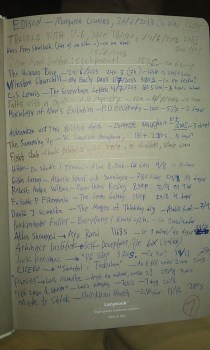How to Keep a Book for Summarizing Books
 Merry Christmas friends!
Merry Christmas friends!
What you do when nobody’s watching matters.
How you spend your holidays matter.
How you spend your free time matters.
These things matter because they say something about who you are.
When you’re at work or in school you have an external pressure imposed on you to perform. On your free time you don’t. Therefore, this is the time when your real self shines through.
That’s why this is the time that it’s most important than you’re consistent in your execution.
Otherwise, you’re just a paper tiger. A person who puts on a show in public. A person who hides the fact that he’s being weak by relying on others for feeling a sense of purpose or getting the motivation to put in the work.
For that reason I’ve been sure not to slack off on my reading in the past week. I’ve read four books, though admittedly two of them were rather short.
Once I finished each of these books I’ve done something very important. I’ve spent some time summarizing the most actionable pieces of information. I’ve written this down in the white book that you see depicted in the image above.
I keep this book specifically for the purpose of summarizing the information of the books I read. This is a great habit and I would recommend anyone who’s not doing it to start.
Let me tell you why I do this.
Learning and Adapting
I spend a lot of time learning new things.
I often decline or ignore offers to hang out or go to social events so that I can read books or practice a skill I’m trying to learn.
To me, learning is not a joke, it’s very serious business. I consider it my job.
I do not want to be average or mediocre. Therefore I must set myself apart by becoming better and more competent. Fortunately, that’s not very hard to do when you learn new things at a faster pace than the average person.
Apart from my hatred of mediocrity, another reason why I place a major importance on learning things is because we humans live by the rule of survival of the most adaptable.
It’s not survival of the fittest – it’s survival of the most adaptable. And the people who learn and apply things the quickest are those who are the most adaptable.
Because I am good at learning things I am not worried that I’ll be left behind and made useless or obsolete by some new trend or technology coming along.
I don’t waste my time fearfully pondering future difficulties. Instead I trust that I’ll learn as I go along – I trust in my ability of adapting to the situation.
Why Should You Summarize Books?
Because summarizing is note taking on steroids.
Not only should you summarize books, but you should summarize every piece of useful information that you come across.
The reason you should do this is twofold:
1.
You need to act while the information is still fresh in mind.
You must write, express, and summarize the information you’ve learned immediately while you’re still seeing the world from this perspective.
You might not realize it, but your frame – the way you interpret information – is constantly changing. As you’re reading a book you’ll become more and more immersed in the author’s way of looking at the world. You’ll start to see the things he speaks about in various situations of your own life.
While you’re still seeing things from this perspective you need to make maximum use of it and put down the core concepts on paper while it’s still fresh in your mind. The thoughts you’re having are often invisible to you right now because you’re too immersed in them. But that’ll change when you review your summarized notes later.
2.
You become better at distilling large chunks of information into the simple essentials.
And that’s always a great skill to have. All leaders are great simplifiers – and you should be too.
By summarizing the things you learn you’ll improve your big-picture thinking and your ability to get down to the core of the message of the book.
The Fallacy that More is Better
If you have any experience of the academic world you know that it secretly encourages and propagates the notion that it’s fancy to write or provide redundant information, in particular in research papers.
A lot of academic people foolishly pride themselves on this, and in university many teachers reward this kind of behavior.
But they’re wrong, and that’s why no one wants to read their boring papers.
Keeping a book for summarizing books is a good way to fight these negative influences if you’ve been poisoned by this fallacy.
Why Summarizing Matters
When you come across intelligent, motivated and successful people you realize that they don’t have that much time. They’re busy perfecting their craft, practicing their skills, and running their businesses.
In other words, they don’t have time for bullshitters or time wasters.
If you want to associate with them you need to say what you want to say and you need to say it now.
I struggle with this myself, but I’ve improved a lot over the past six months. For example, I’m much better at pitching face-to-face and over email than before as a result of having become more succinct.
I attribute much of this improvement to my summarizing of books, articles and other information.
After the Book is Finished
Now you know why I write book summaries.
But you don’t know how I do it, so let me to explain the process.
I read a lot and I have slightly different systems for taking notes and storing information depending on what I read.
I keep different section in my commonplace book for pdf-files, articles, blog posts, and online reading. If it’s a physical book I’ll write down notes on paper with a multicolored pencil.
When I finish reading a book I will do two things:
Summarize the book in my book summary book.
Do a video log explaining the main concepts and key takeaways from the book.
My Process for Writing Book Summaries
First I go through all my notes from start to finish. Then I begin summarizing the information from the book into my special book summary book by writing the most important things first.
I try to keep it as short as possible and cut whatever information I can.
To do this I ask myself the following questions as I go through the notes:
Will I have use for this information 5+ years into the future?
Can this be cut, or is it essential to remember?
Does this have any practical implication or is it merely cool trivia?
I try to keep my summary to 1-2 pages – and the pages are small: About half the size of an A4 paper. If there’s a lot of useful information in the book I’ll probably write a longer summary.
For example when I read Atlas Shrugged I ended up writing 6 pages, but that book is 1200 pages and 2 of those pages were filled with great quotes from Fransisco D’anconia and John Galt.
Make it Easy to Review
 This is the first page in my book for summarizing books. What you see here is the content section. Each line is a book read.
This is the first page in my book for summarizing books. What you see here is the content section. Each line is a book read.
I’ve written the following:
Title
Author
The date I finished the book.
Number of pages
By doing this you’ll make it easier to navigate when it grows.
Know Why You Do This
When you stack up a large number of entries in your book summary book you’ll experience a sense of pride and contentment. Probably because it taps into your evolutionary hoarding instincts.
This is actually good for motivational reasons, but it’s not your main reason for doing this.
You’re doing this to look through the book every once in a while – to rehearse the most important information you have learned.
This book contains only the most concrete, simplified and actionable information out of the books you read; the key takeaways that you’ll want to implement and remember for the rest of your life.
When you summarize books remember to:
Cut what you can – leave only the essentials and the core message.
Keep only the most actionable and useful information.
Make it easy to review
Now go buy an empty book to write your book summaries in!
The post How to Keep a Book for Summarizing Books appeared first on Startgainingmomentum.



